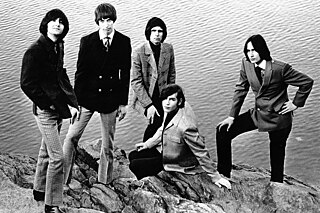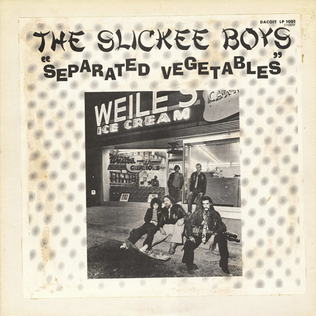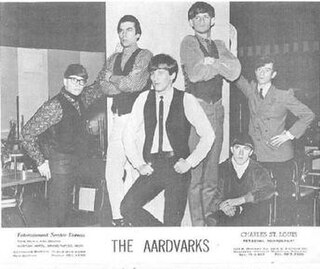
Nils Hilmer Lofgren is an American rock musician, recording artist, songwriter, and multi-instrumentalist. Along with his work as a solo artist, he has been a member of Bruce Springsteen's E Street Band since 1984, a member of Crazy Horse, and founder/frontman of the band Grin. Lofgren was inducted into the Rock and Roll Hall of Fame as a member of the E Street Band in 2014.

Joe's Garage is a three-part rock opera released by American musician Frank Zappa in September and November 1979. Originally released as two separate albums on Zappa Records, the project was later remastered and reissued as a triple album box set, Joe's Garage, Acts I, II & III, in 1987. The story is told by a character identified as the "Central Scrutinizer" narrating the story of Joe, an average adolescent male, from Canoga Park, Los Angeles, who forms a garage rock band, has unsatisfying relationships with women, gives all of his money to a government-assisted and insincere religion, explores sexual activities with appliances, and is imprisoned. After being released from prison into a dystopian society in which music itself has been criminalized, he lapses into insanity.

The Left Banke was an American baroque pop band, formed in New York City in 1965. They are best remembered for their two U.S. hit singles, "Walk Away Renée" and "Pretty Ballerina". The band often used what the music press referred to as "baroque" string arrangements, which led to their music being variously termed as "Bach-rock", "baroque rock" or "baroque pop". The band's vocal harmonies borrowed from contemporaries such as the Beatles, the Zombies and other British Invasion groups.

Franz Kenneth Stahl is an American guitarist. He is a member of the Washington, D.C. hardcore punk band Scream alongside his brother Pete Stahl, and was a member of the rock band Foo Fighters from 1997 to 1999.
The Litter was an American psychedelic and garage rock band, formed in 1966 in Minneapolis, Minnesota, United States. They are best remembered for their 1967 debut single, "Action Woman". The group recorded three albums in the late 1960s before disbanding, but they re-united in 1990, 1992, and again in 1998, when they recorded a new studio album consisting of both old and new material. All of their Minneapolis recorded material was produced by Warren Kendrick, who owned the Scotty and Warick and Hexagon labels.

"Psychotic Reaction" is the debut single by the American garage rock band Count Five, released in June 1966 on their debut studio album of the same name.
Mouse and the Traps was the name of an American garage rock band from Tyler, Texas, United States, that released numerous singles between 1965 and 1969, two of which, "A Public Execution" and "Sometimes You Just Can't Win", became large regional hits. The leader of the band, nicknamed "Mouse", was Ronny Weiss. Two of their best known songs, "A Public Execution" and a cover of "Psychotic Reaction", are not actually credited to this band but, respectively, to simply Mouse and Positively 13 O'Clock instead. Their tangled history also included one single that was released anonymously under the name Chris St. John. The band are not to be confused with the girl group Mousie and The Traps who recorded for Toddlin' Town records around the same time.

Here to Stay compiles all five Slickee Boys 7"s from 1976–1981. It was released by the German label Line Records with a catalog number of LLP 5170. It includes cover versions of songs originally recorded by Perry Como, the Rokes, Vince Taylor, the Yardbirds, the Hangmen, The Chocolate Watch Band, as well as the theme from the film Exodus. According to the liner notes for Mersey, Mersey Me, Talking Heads had dropped the song "Girls Want to Be With the Girls" from their repertoire but re-visited it after hearing the Slickees' version, which beat the Talking Heads version to vinyl by months.

Separated Vegetables is the first full-length album by Washington, D.C.'s Slickee Boys. Self-released on guitarist Kim Kane's Dacoit label, it was pressed in an edition of 100 copies. As well as songs written by the band, it includes cover versions of songs originally by Overkill, Flamin' Groovies, the Road Runners, Johnny Smith, Country Joe and the Fish, the Small Faces, Chuck Berry, and the Hangmen (whose song, "What a Girl Can't Do", the Slickee's had already released on their debut record, 1976's Hot and Cool EP. A mix of studio and live recordings, the album includes a number of tracks taped in front of an appreciative audience at D.C. punk dive the Keg.

George Daly is a music executive, songwriter, musician, video and music producer, multiple awards-winning film director and inventor. In his role as a music Industry A&R executive he has worked with artists and groups such as Janis Joplin, Booker T. Jones, The Cars, Tool (band), Huey Lewis, Carlos Santana, and many others. Artists to whose efforts Daly has contributed have sold in excess of 300 million singles and albums in vinyl, tape, CD, and digital download music streaming formats.

The Grodes, sometimes known as The Tongues of Truth, were an American garage rock band from Tucson, Arizona, that featured lead singer and songwriter Manny Freiser, and were active between 1965 and 1968. They are best remembered for two Manny Freiser written songs, the original version of “Let’s Talk about Girls" and Cry A Little Longer, recorded by The Grodes, the #46 single on the All-Time Garage Rock singles chart.

The Gentlemen were an American garage rock band from Dallas, Texas, who were active from 1964 to 1968. They are best known for their 1966 song, "It's a Cry'n Shame", which has been recognized as one of the greatest songs in garage rock. The band is noted for the contributions of guitarist and songwriter, Seab Meador. Jimmie Vaughan, later a member the Fabulous Thunderbirds and brother of Double Trouble guitarist Stevie Ray Vaughan, served a brief stint for several months in the Gentlemen in late 1965 and early 1966, but did not appear on any of their recordings. He went on to play in another Dallas garage rock band, the Chessmen.
"It's a Cry'n Shame" is a song written by Seab Meador and Mike Kelley and was recorded in 1966 by the Gentlemen, an American garage rock band from Dallas, Texas who were active between 1964 and 1968. It was originally released as the B-side to "You Can't Be True" but has become by far the better-known song. "It's a Cry'n Shame" has been included in several garage rock compilations and is now recognized as one of the greatest songs in the genre.

The Montells were an American garage rock band from Miami, Florida who were active in the 1960s. They briefly operated under the name H.M. Subjects and recorded a version of the Pretty Things's "Don't Bring Me Down," which while in the process of becoming a local hit, became embroiled in a controversy involving Morton Downey, Jr., then a disc jockey at Miami's WFUN and later of talk show fame. The song was criticized for its apparently sexually suggestive lyric and the contention that Downey allegedly took payola for the song, an allegation which was never proven. The band went on to record another single, once again as the Montells, featuring an A-side for which they are remembered, "You Can't Make Me." They broke up in 1967, but reunited for a performance in 2008.

The Dearly Beloved were an American garage rock band from Tucson, Arizona, originally known as the Intruders, who began as an instrumental surf rock combo, but eventually incorporated vocals into their sound after the rise of the British Invasion. After recording their first single as the Intruders, they changed their name to Quinstrels, recording one single under that moniker, but later settling upon the name for which they are best known, the Dearly Beloved. Along with the Grodes, they became one of the top groups in the Tucson area, scoring a #1 hit in there, and were on the cusp of breaking to a wider national audience, even briefly recording with Columbia Records and receiving some airtime on radios stations in other parts of the country, but were unable to maintain the momentum long enough to achieve wider success. Their work is nonetheless highly regarded amongst garage rock and psychedelic enthusiasts.
Exploito is a term generally given to describe cover version or sound-alike recordings that capitalize on the official recordings of artists. Typically they are of the budget release type of album. Often the buying public would think they are buying an album by the actual artist.

The Plagues were an American garage rock band from Lansing, Michigan who were active in the 1960s. They were led by bass player, principal songwriter, and vocalist William Malone. The group had a local and regional hit with "I’ve Been Through It Before". Malone left the band in 1966 to join the Frightened Trees, as the remaining members formed a new group out of the ashes of the Plagues, the Plain Brown Wrapper. Malone later became a successful Hollywood movie director, whose 2008 horror thriller Parasomnia included "I’ve Been Through It Before", as well as other songs by the Plagues and other 1960s garage bands. In the intervening years the Plagues work has attracted a following amongst garage rock enthusiasts and collectors.

The Aardvarks were an American garage rock band from Muskegon, Michigan who were active between 1964-1968. They recorded three singles, two of which were issued on labels of Dave Kalmback's Fenton Records based in Sparta, Michigan. The group scored a local hit with "I'm Higher than I'm Down", which is now considered a garage rock classic, and several of their songs have been included in garage rock compilations.
The Dantes were an American garage rock band from Worthington, Ohio, a suburb outside of Columbus, who were active from 1964–1969. They became one of the biggest groups in the Columbus area, scoring a #1 hit locally with their 1966 song "Can't Get Enough of Your Love", which has become highly regarded by garage rock enthusiasts and collectors.

Euphoria's Id was an American garage rock band formed in Saco, Maine, in 1963. Remembered as a popular live attraction in the New England teen scene, the group released two singles in their recording career, including the band's highly regarded cover version of "Hey Joe". A heavily favored inclusion on the New England Teen Scene compilation album series, a retrospective album was released in response to Euphoria's Id's reinterest.















